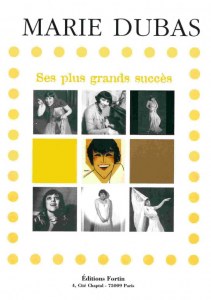Marie DUBAS, her greatest successes
Preface
While leafing through this album, one will be surprised, undoubtedly, by the diversity, the contrast, the extent in a word, of the repertory of Marie Dubas which goes almost from the concert melody: "La mauvaise Prière", to the popular saw "Qui a scié l'acacia" or still, from "Pedro" to the "Doux Caboulot" of Carco, to quote two great popular successes. It will also be by the modernity, attested by the resumptions made with a certain impact by artists, (often in addition interpreters of the songs of Yvette Guilbert), such Pamina or Catherine Delourtet to quote only two among other very gifted artists also...
In 1927, with her headlining performance at the Olympia (directed by Paul Franck), Marie Dubas began a career of thirty years of songs and successes that would consecrate her as one of the great interpreters of French song. She was, in a way, the heiress of Yvette Guilbert and an absolute model and example for the young Edith Piaf. That, in spite of the break of the 39-45 war (of Jewish origin she is banished from the Parisian stages during all this dark period, and her very recordings are forbidden).
In exile, she did not stop singing, in America, Portugal, North Africa, and finally in Switzerland, from where she returned in 1945 to resume a very intense activity (18 performances in Paris between 1945 and 1958). She returned to the Olympia in 1955, which Bruno Coquatrix had just returned to singing, in a memorable program with Damia.
Her health alone forced her to put an end in 1958 to a career of 50 years on stage. Indeed, she had begun to appear at the age of 14 in the theater (comedies, dramas, operettas, reviews, with the "Greats" (Mistinguett, Chevalier) and this training had led her to the explosion in the song. The opposite path of many great "cracks" Raimu, Jean Gabin, Fernandel, Yvonne Printemps, who went from music hall to theater.
It is undoubtedly this long theatrical training, which allowed Marie Dubas to establish a tour of song, or songs, playing on the whole range of feelings, from the comic to the tragic, which she mixed ceaselessly, making laugh sometimes in the first verse and cry in the last. That corresponded first of all also to her nature of dramatic artist who had made his own the motto of Figaro of Beaumarchais "to hurry to laugh of all not to cry of it" built essentially on a spring of tender, sometimes bitter irony.............
François Bellair son of Marie Dubas





